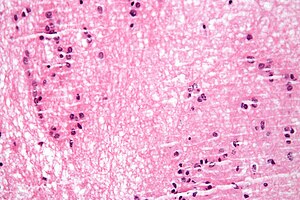Difference between revisions of "Subependymoma"
Jump to navigation
Jump to search
(split out) |
(+infobox) |
||
| Line 1: | Line 1: | ||
{{ Infobox diagnosis | |||
| Name = {{PAGENAME}} | |||
| Image = Subependymoma_-_very_high_mag.jpg | |||
| Width = | |||
| Caption = Subependymoma. [[H&E stain]]. | |||
| Synonyms = | |||
| Micro = microcysts with bluish material (give a spongy appearance at low magnification), clustering of nuclei cluster (described as "bundles of flowers"), bland nuclei | |||
| Subtypes = | |||
| LMDDx = | |||
| Stains = | |||
| IHC = | |||
| EM = | |||
| Molecular = | |||
| IF = | |||
| Gross = | |||
| Grossing = | |||
| Site = [[brain]] - see ''[[neuropathology tumours]]'' | |||
| Assdx = | |||
| Syndromes = | |||
| Clinicalhx = | |||
| Signs = | |||
| Symptoms = | |||
| Prevalence = | |||
| Bloodwork = | |||
| Rads = classically fourth ventricle | |||
| Endoscopy = | |||
| Prognosis = WHO grade I | |||
| Other = | |||
| ClinDDx = other brain tumours - [[ependymoma]], [[CNS lymphoma]] | |||
| Tx = | |||
}} | |||
'''Subependymoma''' is [[neuropathology]] tumour classically found in the fourth ventricle. | '''Subependymoma''' is [[neuropathology]] tumour classically found in the fourth ventricle. | ||
| Line 6: | Line 37: | ||
==Gross/radiology== | ==Gross/radiology== | ||
*Classic location: fourth ventricle.<ref>{{Cite journal | last1 = Hoeffel | first1 = C. | last2 = Boukobza | first2 = M. | last3 = Polivka | first3 = M. | last4 = Lot | first4 = G. | last5 = Guichard | first5 = JP. | last6 = Lafitte | first6 = F. | last7 = Reizine | first7 = D. | last8 = Merland | first8 = JJ. | title = MR manifestations of subependymomas. | journal = AJNR Am J Neuroradiol | volume = 16 | issue = 10 | pages = 2121-9 | month = | year = | doi = | PMID = 8585504 |url=http://www.ajnr.org/cgi/reprint/16/10/2121}}</ref> | *Classic location: fourth ventricle.<ref>{{Cite journal | last1 = Hoeffel | first1 = C. | last2 = Boukobza | first2 = M. | last3 = Polivka | first3 = M. | last4 = Lot | first4 = G. | last5 = Guichard | first5 = JP. | last6 = Lafitte | first6 = F. | last7 = Reizine | first7 = D. | last8 = Merland | first8 = JJ. | title = MR manifestations of subependymomas. | journal = AJNR Am J Neuroradiol | volume = 16 | issue = 10 | pages = 2121-9 | month = | year = | doi = | PMID = 8585504 |url=http://www.ajnr.org/cgi/reprint/16/10/2121}}</ref> | ||
*Well demarcated margin. | *Well-demarcated margin. | ||
*Usu. completely within the ventricle; does not extend into brain (like [[ependymoma]]s). | *Usu. completely within the ventricle; does not extend into brain (like [[ependymoma]]s). | ||
| Line 24: | Line 55: | ||
Image:Subependymoma_-_intermed_mag.jpg | Subependyoma - intermed. mag. (WC) | Image:Subependymoma_-_intermed_mag.jpg | Subependyoma - intermed. mag. (WC) | ||
Image:Subependymoma_-_high_mag.jpg | Subependymoma - high mag. (WC) | Image:Subependymoma_-_high_mag.jpg | Subependymoma - high mag. (WC) | ||
Image:Subependymoma_-_very_high_mag.jpg | Subependymoma - very high mag. (WC) | |||
</gallery> | </gallery> | ||
Revision as of 02:58, 17 February 2014
| Subependymoma | |
|---|---|
| Diagnosis in short | |
 Subependymoma. H&E stain. | |
|
| |
| LM | microcysts with bluish material (give a spongy appearance at low magnification), clustering of nuclei cluster (described as "bundles of flowers"), bland nuclei |
| Site | brain - see neuropathology tumours |
|
| |
| Radiology | classically fourth ventricle |
| Prognosis | WHO grade I |
| Clin. DDx | other brain tumours - ependymoma, CNS lymphoma |
Subependymoma is neuropathology tumour classically found in the fourth ventricle.
General
- Good prognosis - WHO Grade I.
Gross/radiology
- Classic location: fourth ventricle.[1]
- Well-demarcated margin.
- Usu. completely within the ventricle; does not extend into brain (like ependymomas).
Microscopic
Features:[2]
- Microcysts with bluish material - give a spongy appearance at low magnification.
- Nuclei cluster.
- Described as "bundles of flowers".
Negatives.
- No nuclear pleomorphism, no prominent nucleoli, no mitoses.
Images
www:
See also
References
- ↑ Hoeffel, C.; Boukobza, M.; Polivka, M.; Lot, G.; Guichard, JP.; Lafitte, F.; Reizine, D.; Merland, JJ.. "MR manifestations of subependymomas.". AJNR Am J Neuroradiol 16 (10): 2121-9. PMID 8585504. http://www.ajnr.org/cgi/reprint/16/10/2121.
- ↑ 2.0 2.1 URL: http://moon.ouhsc.edu/kfung/jty1/Com05/Com501-2-Diss.htm. Accessed on: 2 June 2011.


